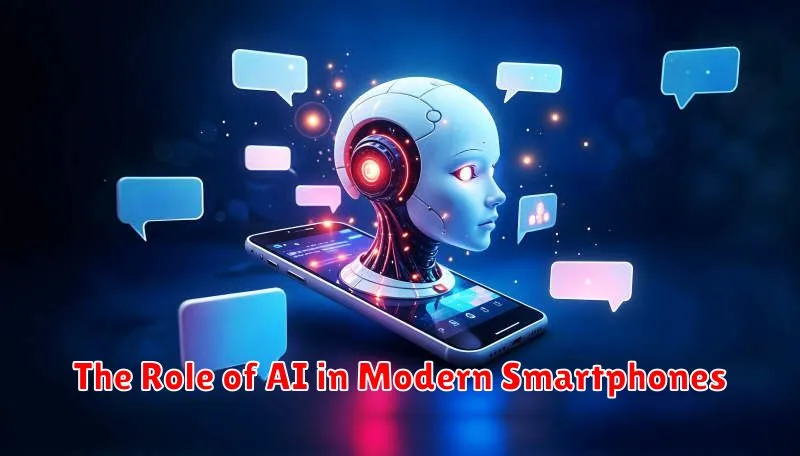Artificial intelligence (AI) is rapidly transforming the capabilities of modern smartphones. From the seemingly simple act of unlocking your phone with facial recognition to the complex processes behind capturing stunning photographs, AI is subtly but significantly enhancing nearly every aspect of the user experience. This pervasive integration of AI in modern smartphones has not only elevated functionality but has also redefined user expectations, driving demand for even more intelligent and intuitive devices. This article explores the multifaceted role of AI in modern smartphones, examining how it powers core features and enables personalized experiences.
Delving into the specific ways AI enhances modern smartphones, we will uncover its influence on areas like photography, battery management, and security. The integration of AI extends beyond mere convenience, enabling features that were previously unimaginable on a handheld device. We will explore how AI algorithms power computational photography, optimizing image quality and enabling features like bokeh effects and night mode. Furthermore, this article will discuss the crucial role of AI in maximizing battery life, optimizing performance, and bolstering security measures on your smartphone.
AI-Powered Photography Enhancements
Artificial intelligence plays a crucial role in elevating smartphone photography. AI algorithms power features like scene detection, automatically adjusting settings for optimal results. This translates to improved image quality across various lighting conditions and subjects.
Furthermore, AI contributes significantly to computational photography techniques. Features like HDR, night mode, and portrait mode leverage AI to combine multiple exposures, reduce noise, and create bokeh effects, respectively. These advancements allow users to capture professional-looking photos with ease.
AI-powered image processing also extends to post-processing. Sophisticated algorithms enhance details, sharpen images, and correct distortions, leading to overall improved photographic output directly on the device.
Smart Battery Management
Artificial intelligence plays a crucial role in optimizing battery life in modern smartphones. AI-powered battery management systems learn user behavior patterns to predict usage and adjust power consumption accordingly.
These systems can identify apps consuming excessive power and suggest optimizations or restrictions. They also dynamically manage background processes, screen brightness, and other factors that impact battery drain.
Adaptive charging, another AI-driven feature, optimizes the charging process to minimize battery degradation and prolong its lifespan. By learning charging habits, AI can control charging speed and even predict optimal charging times.
AI in Voice Assistants

Voice assistants represent a prominent application of AI within modern smartphones. These assistants, such as Siri, Google Assistant, and Bixby, leverage natural language processing (NLP) and machine learning (ML) to understand and respond to user voice commands.
NLP allows the assistant to interpret the meaning and intent behind spoken words, while ML enables it to learn from user interactions and improve its performance over time. This combination allows voice assistants to perform a variety of tasks, from setting alarms and sending messages to providing information and controlling smart home devices.
The accuracy and efficiency of these AI-powered assistants are continually improving, making them increasingly integral to the smartphone experience.
Real-Time Language Translation
One of the most impactful AI-driven features in modern smartphones is real-time language translation. This technology allows users to instantly translate spoken or written text from one language to another. This capability significantly breaks down communication barriers, enabling more fluid conversations and understanding across different languages.
Sophisticated natural language processing (NLP) algorithms power these translation apps. They analyze the input language, identify its meaning, and then generate corresponding output in the target language. This often happens within seconds, making it remarkably useful for travelers, business professionals, and anyone interacting with individuals speaking different languages.
Security and Face Unlock
AI plays a crucial role in enhancing smartphone security, most notably through facial recognition technology for device unlocking. This advanced security measure uses sophisticated algorithms to create a detailed map of the user’s face.
Face unlock systems analyze various facial features, ensuring a high level of security. This technology offers a convenient alternative to traditional methods like PINs or patterns, providing quick and seamless access to the device.
AI-Based App Predictions
One of the most noticeable AI integrations in modern smartphones is app predictions. These predictions anticipate the user’s next action by analyzing usage patterns and contextual information like time of day and location. Predictive app suggestions appear in various interfaces, including the app drawer, notification shade, and even on the home screen.
By learning from user behavior, AI can preemptively load apps in the background, reducing launch times and creating a more seamless user experience. For example, the AI might suggest a music streaming app during a user’s commute or a navigation app when they leave work. This proactive functionality improves efficiency and streamlines daily tasks by placing frequently used apps within easy reach.
Privacy Concerns Around AI
The integration of AI in smartphones raises significant privacy concerns. Data collection practices employed by AI algorithms are extensive, often gathering information about user behavior, location, and communication patterns.
This data is often used to personalize user experiences and target advertising, but the potential for misuse is a growing concern. The sheer volume of personal information collected, combined with the opacity of some AI algorithms, raises questions about data security and the potential for unauthorized access or exploitation.
Furthermore, the lack of transparency regarding how this data is processed and utilized can erode user trust. Users may be unaware of the extent of data collection or how their information is being used, which can lead to feelings of vulnerability and a lack of control over their personal data.

